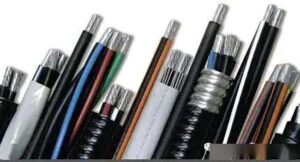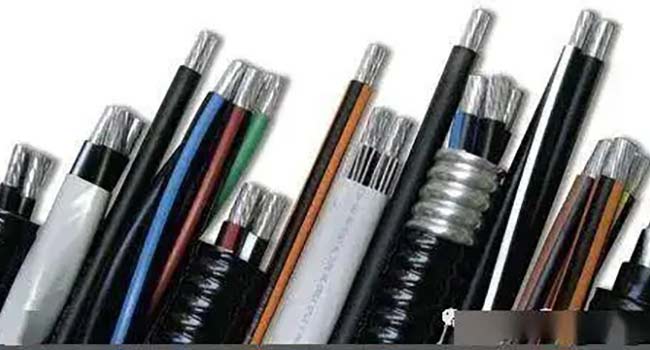Cos'è l'isolamento?
L'isolamento del cavo è una parte importante di qualsiasi cavo. È costituito da un materiale non conduttivo che copre il filo. È noto anche come isolamento elettrico.
Lo scopo dell'isolamento è separare la corrente dal resto del cavo, trattenendolo all'interno del cavo ed impedendogli di penetrare nell'ambiente circostante.
Allo stesso tempo, l'isolamento protegge il cavo dalle dure condizioni dell'ambiente di installazione e ne garantisce il corretto funzionamento.
L'isolamento può essere realizzato con materiali diversi, a seconda dell’applicazione target del filo.
Ma nel complesso, plastica, gomma, e i fluoropolimeri sono i tipi più comuni di isolamento dei cavi.

Plastic Insulation
Polyvinyl chloride (PVC)
Polyvinyl chloride is resistant to moisture, fuoco, and abrasion and can be used in many environments. Per esempio, acids, solvents, and ozone.
PVC insulated cables also have no taste or odor, so they are not toxic. The allowable temperature range for this material is -55°C to 105°C.
Semi-Rigid (SR) PVC
SR-PVC has similar resistance characteristics to Isolamento in PVC, but this material is better when maximum abrasion resistance is a priority.
Leaded PVC
Plenum PVC is also made of PVC, but is best suited for installation in interior areas with air circulation, such as raised floors or dropped ceilings.
Polietilene (PE)
Polyethylene is a rigid material used when high transmission speeds and low capacitance are required.
Polyethylene is also the preferred choice for coaxial cable insulation. This material is resistant to soldering, cracking, and solvents, and operates at temperatures between -65°C and 80°C.
XLPE (polietilene reticolato) insulation is a common subtype of polyethylene insulation.
Polypropylene (PP)
PP has similar properties to PE but is mainly used in indoor environments. The allowable temperature range for this insulation is 30°C to 80°C.
Polyurethane (PUR)
PUR is a flexible material mainly used for cables in low-temperature and marine environments. It is resistant to moisture, sostanze chimiche, and abrasion and has an operating temperature range of -60°C to 90°C.
Rubber Insulation
Thermoplastic Rubber (TPR)
TPR is resistant to high temperatures and harsh weather conditions and is the best choice when high processing speeds are required.
Neoprene (Polychloroprene)
Neoprene is resistant to abrasion, olio, and solvents. This insulating material makes wires durable.
Ethylene-Propylene Rubber (EPR)
EPR is widely used in high-voltage cables – it is flexible and resistant to most irritants. the allowable temperature range for EPR cable insulation is -50°C to 160°C.
Ethylene-propylene-diene monomer (EPDM)
EPDM is resistant to harsh weather conditions, heat and abrasion, as well as being a strong dielectric and flexible. Its operating temperature range is -55°C- to 50°C.
Silicone
Silicone is a widely used flexible synthetic rubber insulation material. This material is particularly useful in high-heat areas as it can withstand temperatures of up to 180°C.
Fibra di vetro
Glass fiber is resistant to moisture and chemicals.
This glass insulation has a maximum operating temperature of 482°C and is often used in kilns, aluminum processing, and heat treatment.
Styrene-Butadiene Rubber (SBR)
SBR has similar properties to neoprene but is mainly used in Mil-C-55668 cable.
Fluoropolymer Insulation Materials
Perfluorinated alkoxy (PFA)
PFA is a robust and, Perciò, durable insulating material that can be used in extreme temperatures (from -65°C to 250°C).
Polytetrafluoroethylene (PTFE)
Polytetrafluoroethylene is a flexible thermoplastic material that is heat, olio, umidità, and chemical resistant.
The allowable temperature range for this material is -70°C to 205°C.
Fluorinated ethylene propylene (FEP)
FEP is typically used in down jackets and military cables due to its high flame resistance and excellent data transmission capabilities.
Polyvinylidene Fluoride (PVDF)
PVDF is also known as Kynar – it is resistant to most irritants, including flame. It is also flexible and not heavy, which makes it well suited for airy indoor environments.
Choosing the right cable insulation
The type of insulation you choose depends on the application scenario of your cable. A Veri Cables, we have various types of cables with aluminum and copper conductor insulation. Per esempio, some of our most popular products are low-voltage aluminum wires with PVC insulation and copper medium and high voltage cables with XLPE insulation. Contact us to get our latest catalog, see more products and find the wire and cable you need for your project.
